GREENEVILLE – Tusculum University celebrated the achievements of five student scholars who recently completed research projects that will further equip them to be career-ready professionals after they graduate.
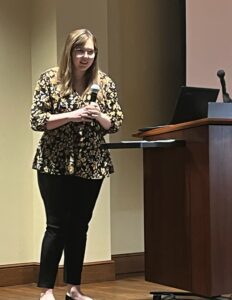
Student Avery Carper discusses her research.
Undergraduates Sarah Calfee, Joe Calloway, Avery Carper, Emma Harriman and Maggie Vickers were selected as Ledford Scholars by the Appalachian College Association in the spring. They received stipends to conduct research during the summer on topics of interest to them that are applicable to their major.
They recently presented the results of their studies to Tusculum family members assembled in the Meen Center.
“Seeing our students engaged in these research projects reinforces the active and experiential education they receive at Tusculum,” said Dr. Scott Hummel, the university’s president. “We are proud of these students for seizing the opportunity to enhance their knowledge and engage in research that will benefit society and enhance their career prospects. They are outstanding representatives of Tusculum, and we are confident they will make an impact throughout their lives as civically engaged citizens.”
Here is a snapshot of the students with their majors, research topics and faculty mentors:
- Calfee – biology with a minor in psychology, “Stress in Academia as a Predictor of Physical and Mental Health,” Drs. Hollie Pellosmaa and Katherine Smith, associate professors of psychology
- Calloway – environmental science, “Survey and Assessment of Chucky Madtom (Notorus crypticus) habitat in Little Chucky Creek,” Dr. Conor Keitzer, associate professor of natural sciences
- Carper – psychology, “General and Self-Stigma surrounding Mental Health Services,” Drs. Pellosmaa and Smith
- Harriman – mathematics, “Transient Dynamics in Coupled Epidemiological Systems with Seasonal Forcing,” Dr. Kellen Myers, associate professor of mathematics
- Vickers – English and history, “The Coffin Collection: Uncovering the Provenance of Tusculum’s First Library,” Dr. Jeffrey Perry, associate professor of history, and Dr. Peter Noll, professor of public history and museum studies
Calfee’s study examined the relationship between perceived and occupational stress on physical and mental health outcomes in academia. She explored the relationships between stress and fasting blood lipids, glucose and self-reported measures of health, such as depression, anxiety and quality of life. From the data she was able to collect, she identified that stress levels negatively impact self-reported measures of physical and mental health.
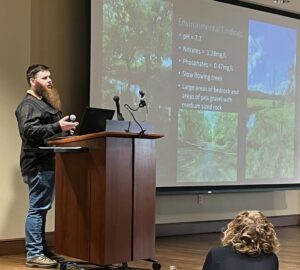
Student Joe Calloway discusses his research conducted as a Ledford Scholar.
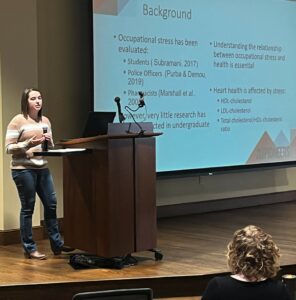
Student Sarah Calfee makes her presentation.
The goal of Calloway’s study was to better understand the habitat quality and possible evidence of the Chucky Madtom. He conducted 20 environmental assessments in Little Chucky Creek, which is located in Greene County. No Chucky Madtoms were seen during the study. Findings showed a large presence of invasive crayfish, which directly compete with Chucky Madtoms for habitat. He also discovered that water quality was suboptimal for sensitive species like the Chucky Madtom.
Carper investigated potential demographic differences as well as factors associated with general stigma and self-stigma in relation to the usage of mental health services. She discovered that certain demographics – males, current military members and nonstudents – were more likely to report general stigma and self-stigma with mental health services, while other demographics, such as females, Democrats and students, reported experiencing more mental health symptoms. This suggests that while individuals might experience mental health issues, not all are seeking treatment, possibly due to stigma associated with mental health, she said.
Harriman investigated the coupled dynamics of seasonal birth rates and a disease outbreak in a two-species system. That extended recent work that found demographic patterns alone driving differences in disease burden, building a more general model and exploring the new parameters in that model. She showed that metrics of disease burden can be sensitive to changes, sometimes even small ones, in the frequencies and phases of demographic cycles of the two species.
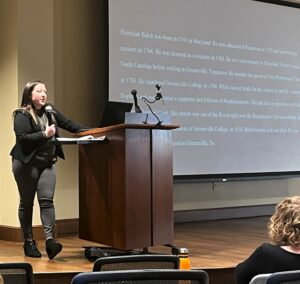
Student Maggie Vickers presents her research in front of Tusculum family members.
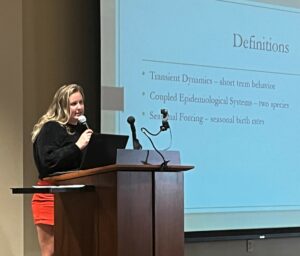
Student Emma Harriman presents the research she conducted as a Ledford Scholar.
The original library of Greeneville College, a predecessor name for Tusculum University, is known as the Coffin Collection and is located in the Old College building on campus. It contains thousands of books that were donated by Congregationalists in New England to the Presbyterian-affiliated Greeneville College during the first decades of the 19th century. Vickers spent 132 hours analyzing 1,613 books from the collection, and the project shed light on the relationship between the two denominations.
“Research is a hallmark of the undergraduate student experience at Tusculum and gives students practical experience that will benefit them throughout their careers,” said Dr. Tricia Hunsader, the university’s provost and vice president of academic affairs. “To have five of our students selected as Ledford Scholars is quite an honor and reflects highly on the caliber of our students, the extensive faculty mentorship and the desire by Tusculum to have our Pioneers hit the ground running in their careers after graduation.”
Individuals can watch video summaries of the students’ research, prepared for the ACA, by visiting https://www.acaweb.org/2022-ledford-scholars-presentations/. More information about Tusculum is available at www.tusculum.edu.


